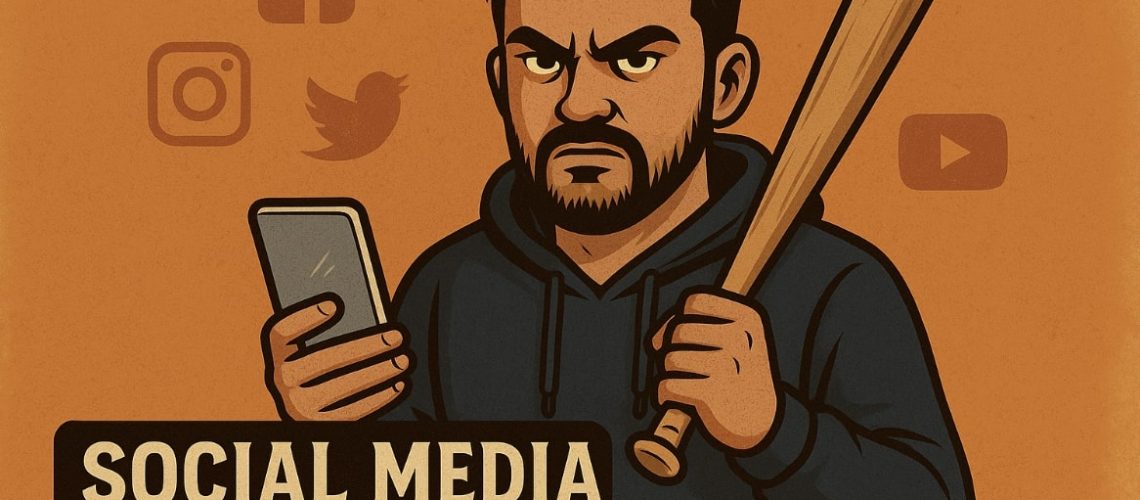In the massive digital landscape of India, where over 800 million people have access to the internet, a new breed of internet personalities has emerged, Social Media Influencer Vigilantes.
At first glance, Social Media Influencers appear as heroes / social activists, who are actually ordinary citizens exposing scams, fighting unethical business practices, calling out corrupt practices. They rally with millions of subscribers with just a mere smartphone and a cause
But the darker reality emerges where most of the stories are one-sided narratives, often with filthy language, mob mentalities, hate-mongering presenting with no formal fact checking, threaten to dismantle the very idea of justice they claim to uphold.
Who Are These Vigilantes?:
Unlike traditional content creators who focus on entertainment, education or travel etc., vigilante influencers leverage their platforms for aggressive activism. Many influencers consider themselves the voices of people who uncover wrongs that are usually unnoticed. Their weapon is simply a smartphone camera and their battlefield is on YouTube, Instagram, & X.
Few influencers venture into physical confrontations, storming into businesses, catching alleged wrongdoers on camera, and confronting them in viral videos.
Why the Popularity ?:
Many Indians have grown up witnessing slow, inaccessible justice systems. Filing a complaint with authorities often means months or years of follow-up, sometimes without results. In contrast, these vigilante videos offer instant justice, wrongs exposed, culprits shamed, apologies extracted all in less than 05 minutes.
Some of the main reasons include (a) These influencers speak the language of the common person, colloquial Hindi, Telugu, Marathi, Tamil and not the legal jargon. (b) They are “one of us,” not faceless bureaucrats. (c) Often, outcomes are faster than authorities, press, or courts.
Darker Side of Social Media Vigilantes?:
While many vigilante influencers genuinely uncover important issues, the unchecked power they wield is concerning:
- Individuals are often named and shamed before any legal process or professional fact-checking. What happens if the accusation is wrong? Damage to reputation can be irreversible.
- Clickbait titles like Big Scam Exposed or He Cheated The Public or Do You Know About This Person drive views but can sometimes exaggerate minor issues.
- The majority of the vigilantes are biased, choosing to expose only those they dislike or ignore similar wrongdoings done by others.
- YouTube monetisation rewards sensational content. More anger, more views, more advertisement revenue, and this creates a dangerous incentive to make up more drama in the content published.
- The majority of the Vigilantes put themselves and others in danger by confronting potentially violent individuals without police & legal backup.
- Many defamation cases charges are being charged against influencer vigilantes, complicating the very “justice” they seek for the simple reason of posting content with no due diligence.
Vigilante Examples:
An Andhra Pradesh travel YouTuber has made serious allegations implicating a reputed film actor, the Director General of Police of Telangana, and the Chief Secretary of Telangana in connection with betting apps. His claims were published without any formal fact-checking, coordination with law enforcement or judicial authorities, or adherence to principles of responsible journalism.
A YouTuber from Hyderabad who exposed a massive food adulteration racket in a highly reputed eatery, leading to police raids and arrests. She carefully documented evidence, coordination with legal and law enforcement authorities, and responsible journalism..
The difference? Ethics and Process:
All influencers who want to be seen as legitimate watchdogs must have the basic qualities, (a) through fact-checking before publishing. (b) The accused must be offered a chance to respond. (c) Work with law enforcement and judicial authorities. (d) Public interest should have a priority over personal fame. (d) Understand the difference between exposing scams vs inciting mobs.
Some responsible YouTubers like Ankur Warikoo have even publicly spoken about “content responsibility”, warning newer creators that “with reach comes enormous responsibility.”.
What to do if you are a victim of Vigilantism? :
- BNS ACT – (a) Section 78 – False Information (b) Section 356 – Defamation (c) Section 124 / 153 – Promoting Enmity / Hate via Misinformation
- IT Act – (a) Section 66E – Punishment for violation of privacy
Where Are We Heading? :
The rise of social media vigilantes represents both the best and the worst of digital India. It reflects the energy of a young, impatient nation unwilling to wait for change. It also warns us that without ethics, wellbeing and humility, even the most well-known “heroes” are becoming reckless and harmful, just taking the opportunity of mobs (followers).
Future belongs not just to the loudest voice on social media but to the one that also knows to verify, and act with wisdom. (a) India doesn’t just need influencers. (b) It needs ethical influencers. (c) It needs responsible digital citizens. (d) It needs a new model: Vigilance with Values.



